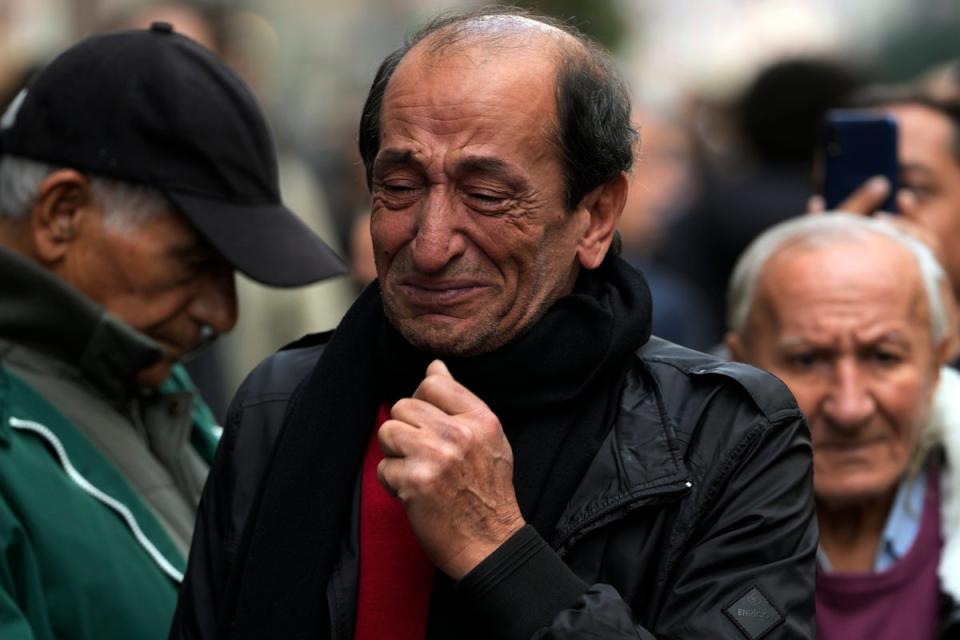Turkish police arrest female suspect over deadly Istanbul bombing
- Oops!Something went wrong.Please try again later.
- Oops!Something went wrong.Please try again later.
Turkey said on Monday it had arrested 46 people. including the perpetrator of the deadly bomb attack in central Istanbul, which left at six dead.
Photos and video posted by Turkish media showed police storming an apartment where they held a Syrian woman named Ahlam Albashir, who they claimed left an explosives-filled bag on a bench along Istiklal Street, a mile-long pedestrian avenue filled with shops, cultural sites and diplomatic outposts.
Photos showed police grabbing Ms Albashir, dressed in a purple hoodie emblazoned with the words “New York,” and taking her into custody.
No group has claimed responsibility for the attack. But Turkish Interior Minister Suleyman Soylu blamed Syria-based Kurdish militant groups. The bombing killed six Turkish citizens, including a father and his three-year-old daughter. It shocked the nation and dominated headlines and news broadcasts.
On Monday morning passersby left red carnations on the site of the bombing in remembrance of the dead and their families.
“We will retaliate against those who are responsible for this heinous terror attack,” Mr Soylu said, according to the state-run Anadolu News Agency.
Istiklal Street is one of the most heavily surveilled parts of Turkey, under the scrutiny of a wide network of private and government security cameras. It is constantly patrolled by both plainclothes informants and officers and conspicuous contingents of heavily armed police units.
Turkey’s justice minister Bekir Bozdag said the suspect sat on a bench near the scene of the blast for more than 40 minutes before the explosion, which took place minutes after she walked away. Authorities claim the woman disclosed that she had been trained by Syrian Kurdish armed groups.
“There are two possibilities,” Mr Bozdag told A Haber news. ”There was a bomb set up inside a bag. Either she detonated it or someone detonated remotely.”
The attack likely ends what had been a banner tourism season that had helped make up for months of lockdowns during the Covid pandemic. The consulates of France, Russia, Greece, Sweden, the Netherlands, and Greece also lie along Istiklal while the United Kingdom’s sprawling diplomatic outpost is nearby.
Turkey has suffered numerous terrorist attacks over the years, including a 2016 Isis suicide bombing on Istiklal Street. The attacks often prompt security worries that tend to rally the public around authorities.
Mr Soylu claimed the attack was ordered by the People’s Union Party (PYD), an affiliate of the Kurdistan Workers Party (PKK), which are both considered terrorist organisations by Ankara. Without citing evidence, he claimed the bombing was ordered by PYD officials in Kobane, a crucial city under the control of Syrian Kurds and also called Ain al-Arab.
“Our assessment is that the order for the deadly terror attack came from Ayn al-Arab in northern Syria, where the PKK/YPG has its Syrian headquarters,” Mr Soylu said.
Mr Erdogan, who is currently in Indonesia for the summit of the Group of 20, has been lobbying to get Iran and Russia, powerbrokers in Syria, to greenlight a Turkish attack on Kobane and other northern Syrian cities under the control of Kurds.

Sunday’s bombing could have political implications ahead of crucial June 2023 elections. Turkish President Recep Tayyip Erdogan and his Justice and Development Party (AKP) are polling poorly against a coalition of opposition groups led by the Republican People’s Party (CHP).
Devlet Bahceli, leader of a far-right party that is part of Mr Erdogan’s government, demanded the shuttering of the country’s main Kurdish-led opposition party, the Democratic People’s Party (HDP), and accused the CHP of backing the PKK. Meanwhile CHP-affiliated news outlets accused the government of wooing the HDP in the weeks preceding the bombing.
Mr Soylu also sought to implicate the United States in the bombing, accusing Washington of backing the PKK. The US and other western countries collaborate with Syrian Kurds in efforts to contain Isis. Mr Soylu likened Washington’s public condemnation of the bombing to "the killer arriving as one of the first to the scene of the crime."

